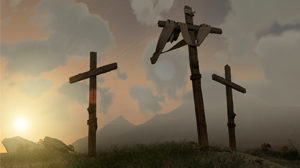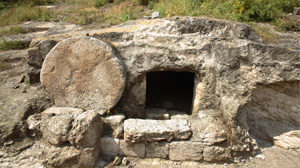Reflection:
… they had come to know him in the breaking of the bread.
I’ve been suffering lately, and it’s really had me frustrated. In my life I’ve been hurt deeply, and physically injured, broken bones, had surgery, been sick – but this thing now has me tearing my hair out.
Writer’s Block.
Melodies, texts, reflections, prayers, commentaries, journals… there’s so much I have to do – the deadlines are looming – and yet it seems as though I can make headway on absolutely none of it. And what’s most irritating is knowing what I want to write, and yet not getting past the idea to free the path to what’s in my head. Arrgh!!!
So this morning, while at breakfast with my young daughter, she asked, “Papa, why do you look so worried?” I replied, “Well, sweetheart, I have a bunch of projects I need to complete, and things I need to write, and I’m having so much trouble being able to really get what’s in my head out on paper.” She looked at me for moment, processed it a little bit, and then asked, “What is it you need to do?” “Oh, Miss Love. There’s just so much…”
“Forget about doing all of it… What do you have to do *right now*?”
And so I told her about this reflection you’re reading right now. I told her about the Gospel, and how Jesus appeared to the Apostles and asked for fish. How frightened and in awe they must have been. And how the Apostles in the first reading cured the sick, all the while saying they didn’t do these great works alone. And she said, with a depth and wisdom way beyond her 9 years, “You mean like ‘I can do all things through Christ who gives me strength’?”
“Yes! Yes, sweetheart! It’s exactly like that. You see, the Gospel today begins with how Jesus revealed himself to people through the ‘breaking of the bread.’ Even when they thought all was lost, and all was dead, it was sharing in the brokenness that really allowed them to see God’s work alive in their life. And the Apostles lived that faith as they cured the sick. There is always new life to be sprouted if only we would live the examples given to us – to share honestly and authentically with one another, to break open our struggles and hopes – which allows God the room, the tools with which he’ll work miracles. All we have to do is get out of God’s way.”
“Golly, Papa. Why don’t you just write that?”
This is not the first time God has worked through my problems with me in such a significantly simple way. Exactly what I wanted to say and focus on with today’s Scripture was exactly how God revealed himself to me… and through my little girl. All I needed to do was let go of the future worries, share my current struggle, and listen. I needed to get out of God’s way. And guess what? A miracle happened.
In the breaking of the bread, Christ is revealed. Healing. Death and resurrection. New life.
How are you in the way of God’s miracles?
Who is God to you, today?
Who are *you* going to be God for?
Dear God, thank you for the gift of your most amazing and ever available presence. Please grant us the grace to always break open ourselves, and let your miracles shine. Amen.
Paul Puccinelli is Director of Liturgy & Music at St. Rita Parish in Sierra Madre, California, and a member of the Retreat-Team at Mater Dolorosa Retreat Center.








